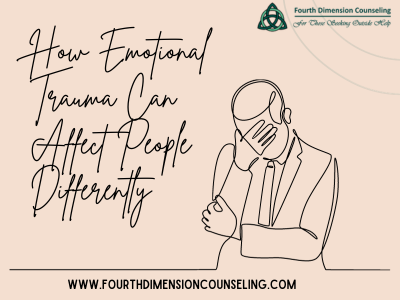 Emotional trauma is a deeply distressing experience that can leave lasting scars on an individual’s mental and emotional well-being. Trauma can result from various life events, such as accidents, abuse, loss, or witnessing a traumatic event. While trauma is a universal human experience, its impact varies significantly from person to person. Let’s delve into the complex ways in which emotional trauma can affect people differently.
Emotional trauma is a deeply distressing experience that can leave lasting scars on an individual’s mental and emotional well-being. Trauma can result from various life events, such as accidents, abuse, loss, or witnessing a traumatic event. While trauma is a universal human experience, its impact varies significantly from person to person. Let’s delve into the complex ways in which emotional trauma can affect people differently.
-
The Nature of Trauma
Trauma can manifest in various forms, including physical, emotional, and psychological. It often disrupts an individual’s sense of safety, trust, and overall well-being. Common sources of emotional trauma include:
- Physical trauma: Such as accidents, injuries, or illnesses.
- Emotional trauma: Such as the loss of a loved one, relationship breakups, or humiliation.
- Psychological trauma: Such as witnessing or experiencing violence, abuse, or natural disasters.
-
Individual Resilience
One of the most significant factors influencing how trauma affects individuals differently is their level of resilience. Resilience refers to a person’s ability to adapt and bounce back from adversity. Some individuals possess higher levels of resilience, enabling them to cope with traumatic experiences more effectively. They may exhibit increased emotional strength, adaptability, and a quicker recovery process.
Conversely, individuals with lower resilience may struggle more profoundly when faced with trauma. They might experience heightened emotional distress, ongoing symptoms, and a longer recovery period. Factors such as genetics, early life experiences, and the presence of a strong support system can impact an individual’s resilience.
-
Timing and Duration of Trauma
The timing and duration of the traumatic experience can also play a crucial role in how it affects an individual. For instance:
- Acute trauma: A single, isolated traumatic event can lead to immediate distress and emotional upheaval. People experiencing acute trauma may display symptoms such as shock, anxiety, and depression.
- Chronic trauma: Prolonged exposure to traumatic conditions, such as ongoing abuse or conflict, can result in complex trauma. This type of trauma often leads to a more severe and enduring impact on an individual’s mental health. Complex trauma may manifest as complex post-traumatic stress disorder (C-PTSD) and can affect various aspects of a person’s life, including relationships, self-esteem, and overall functioning.
-
Emotional Trauma Coping Mechanisms
How individuals cope with trauma significantly influences its impact on their lives. People employ various coping mechanisms to manage their emotional distress, and these mechanisms can vary widely. Some common coping strategies include:
- Seeking professional help: Therapy and counseling can provide essential tools and support for processing and healing from trauma.
- Social support: Having a strong support network of friends and family can buffer the effects of trauma.
- Self-care: Engaging in self-care activities such as exercise, mindfulness, and relaxation techniques can help individuals manage their emotional responses to trauma.
- Maladaptive coping: Some individuals may turn to harmful behaviors like substance abuse, self-harm, or avoidance as coping mechanisms, which can exacerbate the impact of trauma.
Emotional trauma is a complex and deeply personal experience that affects individuals differently based on various factors, including resilience, timing, and coping mechanisms. It is essential to recognize that no two people will respond to trauma in exactly the same way. Understanding these differences and providing support, empathy, and access to mental health resources can help individuals navigate their journey to healing and recovery. The road to healing from trauma is unique for each person, and it is essential to respect and honor those individual differences.
